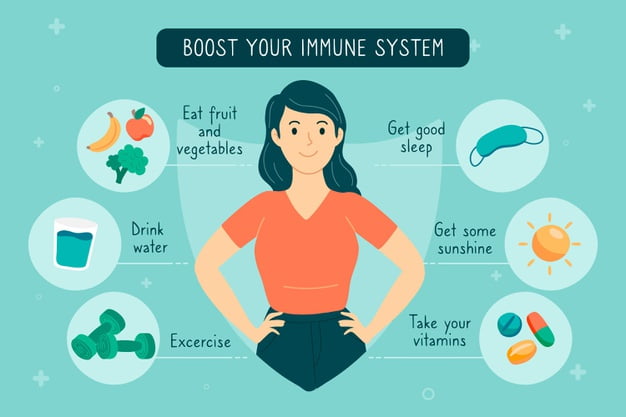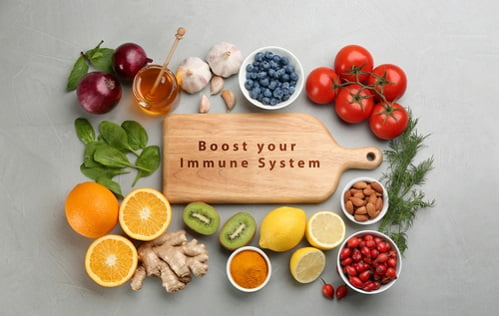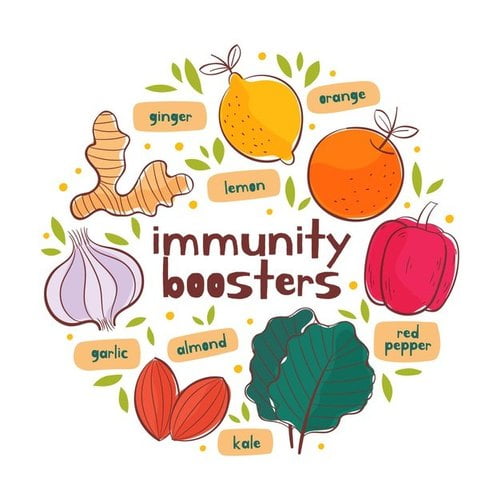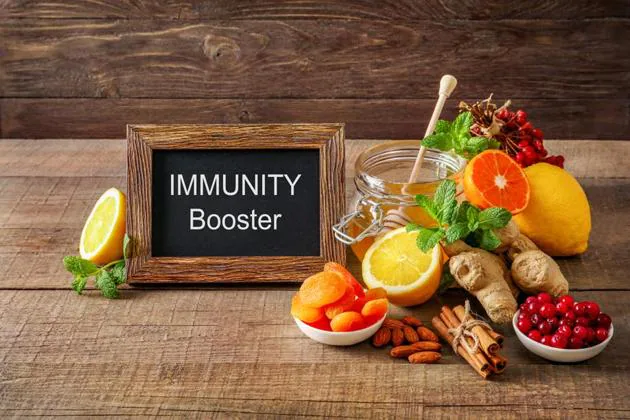Every year, many people suffer from illnesses. These illnesses can range anywhere from a cold to the flu. Immunities are our body’s way of protecting us against these diseases and other ailments.
Immunity boosters are substances that help boost or maintain immunity in humans by protecting against pathogens, toxins, and pollutants.
This blog post will discuss what immunity is, how it works, why you need it, types of immunity boosters available today including foods sources for them as well as experts’ opinions on the importance of boosting your immune system!
Contents
Immunity And Immunity Boosters

The human body has an innate ability to keep itself protected from foreign bodies, whether internal or external. This is known as immunity and plays a significant role in our lives. Understanding how this works can help you take the necessary precautions when it comes to your health during flu season for example! For now, let us understand a bit in detail what are foods that are immunity boosters. And how they function.
What Are Immunity Boosters
Immunity boosters like vitamins and minerals are important to us. Because they improve our immunity and keep our bodies healthy and working properly. Cutting on their intake will make us sick all the time!
Function Of Immunity Boosters

The human immune system is designed to fight off anything that invades our body. It does this by making antibodies and white blood cells. They are then released into the bloodstream. These antibodies and WBC’s attack foreign invaders like viruses or bacteria.
These foreign invaders cause us to become sick with things like colds, flu, and other infections. Although our immune system is strong, it can be overtaken by a large number of different bacteria or viruses. They cause us to become sick with an illness that we have never experienced before.
With the help of immunity boosters though, this wouldn’t happen as often. Because these vaccines will fight off any foreign invader who wants to take over our body. This is why immunity boosters are so important to have throughout your life. Because they will help prevent you from ever getting sick with something like the plague or smallpox.
To put simply, these boosters provide nutrients such as vitamins, antioxidants, and essential amino acids that boost the function of your immune system so you can fight off illnesses and stay healthy.
Examples Of Immunity Boosters

Some examples of immunity boosters are:
Vitamin C
Rich foods like oranges, lemon, kiwi, and strawberries.
Zinc
Sources include oysters, lobster, beefsteak, and poultry.
Vitamin A
Rich in beta carotene which can be found in carrots, kale, and pumpkin.
Selenium
Selenium is best known for its role in thyroid hormone metabolism. But it also plays a critical role in immune function. It is found abundantly in Brazil nuts and tuna.
Calcium
Sources include dairy products like milk, cheese, and yogurt as well as dark leafy greens such as kale and broccoli which are high in Vitamin K. They help the body absorb calcium for bone health. Severe deficiencies have been linked to several disorders including rickets and osteoporosis.
NOTE:
Some common examples include garlic cloves that contain a powerful antioxidant called allicin. They help boost the immune system naturally without you having to take any supplements.
Many people also include fruits and vegetables in their diet. As these contain many antioxidants which help fight free radicals that cause cell damage and disease, such as cancer cells.
Food Sources Of Immunity Boosters

Fruits
Oranges, Grapefruits, Strawberries all contain high levels of Vitamin C that help boost your immune system.
Vegetables
They are also high in Vitamin C and contain many other nutrients that help fight off diseases and infections. Broccoli, cauliflower both have lots of iron to help your red blood cells absorb oxygen more efficiently.
Omega-three fatty acids
Some rich sources are fish like salmon or tuna. These fatty acids can be consumed directly or through fish oil supplements. These acids are known for their ability to reduce inflammation in the body and brain, which is why they can help treat arthritis or prevent heart diseases.
Herbs And Spices
Many herbs like oregano, ginger root, thyme have anti-bacterial properties that fight off infections in your respiratory tract while also by eating fish or through supplements.
Immunity Boosters And Disease Recovery
Disease recovery and immunity boosters are generally things that you should be focusing on when trying to recover from something like the flu. Make sure that your body is:
- Getting enough rest
- Staying hydrated by drinking lots of water or other liquids (especially if suffering from diarrhea)
- Eating healthy foods such as fruits, vegetables, protein-rich meals which can include meat, fish, and beans
Now, the reason you need to take immunity boosters is so that your body can fight off diseases and infections. This will help speed up recovery time once you have been sick because of using all of your energy fighting it off. You can speed up your recovery by taking immunity boosters in infections such as:
- Common Cold,
- Flu,
- Yeast Infection, or
- Diarrhea
In the case of disease recovery, or to prevent diseases from occurring in the first place, immunity boosters are recommended for various ailments. Including:
- Cancers,
- Asthma,
- High Blood Pressure,
- Poor Circulation,
- Infection by bacteria such as E-coli.
NOTE:
People with chronic health problems such as HIV, severe kidney disease, and diabetes should strictly seek advice from a dietician or medical professional before using any supplements.
You should also be staying away from greasy or sugary foods. They can make your symptoms even worse. Like eating chips on the couch when you’re sick because it’s not good for anyone to eat while lying down!
Immunity Boosters For Specific Diseases
Antioxidants
They help fight off free radicals in your body that cause diseases such as cancer. Antioxidants also protect against infections by boosting immune function. They can be found in a variety of foods such as green tea, fruit, and veggies.
Probiotics
They help fight off yeast infections and other intestinal issues. These are also very common and can usually be bought over the counter at your local drugstore or supermarket.
Probiotic supplements may not always work though. So it’s best to try to incorporate them into your diet through things like kombucha, fermented foods, or other products.
Herbs
They help boost immunity too which can be found in teas and tinctures. These also have good anti-inflammatory properties. So they work great on the body when it’s been injured by diseases such as arthritis or asthma.
Supplements
There are also immunity boosters in the form of supplements that you can take which contain all of these nutrients and more. These work great when trying to recover from something like food poisoning. But remember if your doctor prescribes antibiotics it’s best not to mix
Vaccines
There are many different types of vaccines that can be given throughout one’s lifetime. They mainly activate our immunity system to fight against a virus, bacteria, or infection. Some common examples that can be quoted here are:
Smallpox Vaccine
It was created in 1796 by an English doctor named Edward Jenner. It has saved many lives since its creation 200 years ago.
Measles Vaccines
It was introduced in 1954. It helped to reduce deaths from this disease significantly compared to previous periods. Thousands of people died each year because they caught measles if exposed to it.
Novel Corona Virus Vaccines
They have been developed on priority across the world to flatten the curve and restore life to post-pandemic times.
Dieticians and Experts On Immunity Boosters
Some dieticians recommend the following daily intake for immunity boosters:
Vitamin A
900 micrograms (mcg) or 3000 IU every day as part of your multivitamin/multimineral supplement, but not more than 2400 mcg for pregnant women, and 3000 IU per day if you are lactating.
Vitamin D
60 milligrams every day Vitamin D is worth considering. It boosts immunity by activating immune cells that destroy bacteria or viruses in the airways of your lungs. Adults need between 400 to 800 international units (IU) daily depending on age, weight, skin pigmentation, and exposure to sunlight.
Vitamin E
It is found in vegetable oils including sunflower oil, safflower oil, and soybean oil, almonds, hazelnuts or ground nuts (peanuts), wheat germ, whole grains. Such as brown rice, and whole meal bread, green leafy vegetables including spinach, kale, and turnip greens.
Iron
It is found in meat including beef, pork, lamb, or chicken liver; fish such as tuna, oysters, and sardines; green vegetables like peas, beans (legumes) including lentils which are also a good source of protein. Some iron is better absorbed with foods rich in vitamin C.
Zinc
It plays a role in growth and development, the immune system, and healing wounds so sources include red meat such as beef or lamb. Other good sources of zinc are turkey, pork chops, cashews, almonds, baked beans (lima beans), nuts including peanuts.
Garlic & Onion
Garlic boosts the immune system, while onions contain quercetin which is also an antioxidant that can help fight off infections.
Green Tea
Green tea contains catechins (antioxidants) and other antioxidants like polyphenols. Both of which are important in protecting cells against damage caused by free radicals. Studies suggest it may protect us from chronic diseases such as cardiovascular disease and cancer.
Kiwi fruit
Kiwifruit is a good source of vitamin C and it provides other nutrients including fiber, potassium (which helps maintain normal blood pressure), folate (vitamin B), magnesium, and copper. It may also help to boost immunity by providing antioxidants that protect the cells from damage caused by free radicals.
Whole Grains
Whole meal bread, brown rice, and whole-wheat pasta provide fiber which helps maintain a healthy digestive system. They are also good sources of important nutrients including iron, B vitamins (thiamin, riboflavin) zinc, and magnesium. Other options include barley, buckwheat, or whole meal oats.
Conclusion
There are many ways to boost immunity. But the best way is through a healthy lifestyle. Eating well and exercising every day will keep your immune system strong. You should also make sure you’re getting enough sleep (6-8 hours), drinking plenty of water (at least 8 glasses), and wearing sunscreen when outside during peak sun hours to avoid skin cancer or other harmful effects from the sun.
For more information on healthy and nutritious foods, you can contact Mantra Care. We can help you develop a healthy weight management program that is tailored to your specific needs and goals. You can also consult with a registered dietitian or nutritionist through our online nutrition counseling if you have any questions or concerns about starting a new diet.


